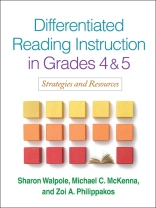With a unique focus on grades 4 and 5, this book explains how to design and implement a research-based reading program that helps all students build major literacy skills (word recognition, fluency, vocabulary, and comprehension). The expert authors present ready-to-use activities, strategies, and lesson plans, along with detailed guidance for assessing students and providing instruction in differentiated small groups. Teachers get a clear understanding of how differentiation works in a tiered response-to-intervention model and how it aligns with the Common Core Standards. In a convenient large-size format, the book includes extenxive reproducible checklists and forms.
قائمة المحتويات
1. Differentiation and Tiered Instruction2. Research on Upper Elementary Readers3. Designing an Upper Elementary Reading Program4. Choosing and Using Assessments5. Building Word Recognition6. Building Fluency7. Building Vocabulary8. Building Comprehension9. Creating a Climate for Extensive, Meaningful Reading and Writing10. Putting It All Together• Appendices. Reproducible Classroom Materials A. Tier 1 Planning Templates B. Informal Decoding Inventory C. Word Recognition Lessons D. Reciprocal Teaching Reminders E. QAR Reminders F. Book Club Reminders G. Text Structure Graphic Organizers H. Word Recognition and Fluency Sample Plans I. Fluency and Comprehension Sample Plans J. Vocabulary and Comprehension Sample Plans• Glossary of Reading Terms
عن المؤلف
Sharon Walpole, Ph D, is Professor in the School of Education at the University of Delaware. She has extensive school-based experience designing and implementing tiered instructional programs. Dr. Walpole has also been involved in federally funded and other schoolwide reform projects. Her current work involves the design and effects of schoolwide reforms. She has coauthored or coedited several books, including How to Plan Differentiated Reading Instruction, Second Edition: Resources for Grades K–3; The Literacy Coach’s Handbook, Second Edition; and Organizing the Early Literacy Classroom. Dr. Walpole is also Series Editor, with Michael C. Mc Kenna, of The Essential Library of Pre K–2 Literacy. She is a recipient of the Early Career Award for Significant Contributions to Literacy Research and Education from the Literacy Research Association and the Excellence in Teaching Award from the University of Delaware.Michael C. Mc Kenna, Ph D, was Thomas G. Jewell Professor of Reading in the Curry School of Education at the University of Virginia until his death in 2016. He authored, coauthored, or edited more than 20 books, including Assessment for Reading Instruction, Third Edition; How to Plan Differentiated Reading Instruction, Second Edition: Resources for Grades K–3; and Organizing the Early Literacy Classroom; as well as over 100 articles, chapters, and technical reports on a range of literacy topics. Dr. Mc Kenna also served as Series Editor, with Sharon Walpole, of The Essential Library of Pre K–2 Literacy. His research was sponsored by the National Reading Research Center and the Center for the Improvement of Early Reading Achievement. He was a corecipient of the Edward B. Fry Book Award from the Literacy Research Association and the Award for Outstanding Academic Books from the American Library Association, and a member of the Reading Hall of Fame. Zoi A. Philippakos, MEd, is a doctoral student in Literacy Education at the University of Delaware. She has her master’s degree in Reading and has worked as an elementary school teacher and literacy coach. Her interests include reading and writing instruction for students in the elementary grades. Ms. Philippakos provides professional development to teachers about effective reading and writing strategies. She is a cochair and cofounder of the Writing Study Group at the Literacy Research Association (LRA) and a cochair of the Graduate Students as Researchers Study Group also hosted at the LRA. She piloted many of the instructional strategies included in this book.












